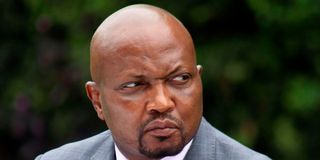Kuria assault bares regime’s fear of media

Trade Cabinet Secretary Moses Kuria.
Writer-journalist Martin Bell says in In Harm’s Way, based on his coverage for the BBC of the 1992-1995 Bosnian War, it was involvement, not indifference, that made for the incentive in the business of journalism.
Trade Cabinet Secretary Moses Kuria’s recent outburst at a public rally and on Twitter over an NTV exposé of possible loss of taxpayers’ money in an edible oils import saga, I found, was adversely inimical to the above aspect.
The minatory tweet, directed at Nation Media Group (NMG), came on the morrow of another one by Kericho Senator Aaron Cheruiyot, the Leader of Majority in the Senate, in which he aimed threats at the media and banks for alleged bias.
Mr Kuria’s was the latest front in the President William Ruto-led regime’s itch and predilection for absolute control. Both tweets have since been roundly condemned. But the duo may have quickly forgotten—or are deliberately amnesiac about—the fact that they and the political coalition to which they belong, Kenya Kwanza, rose to power partly thanks to a campaign spiel disseminated largely through the media.
In these hard economic times, with Kenyans projecting their exasperation on the new regime, the media’s role in offering reassurance, constructive criticism, intellectual discourse and foresight cannot be gainsaid. Freedom and vibrancy are vital to the capacity to report on the government’s obligation to Kenyans and sound out and capture its views and aspirations.
Vibrant media
Innovation and continual mainstreaming of intellectual and creative ideation aside, the evolution and sustenance of vibrant and independent media was the good karma that saw to the first world’s fast societal development. It’s partly why public discourse was, and is, mostly moderated by universities in the UK and the US. The university-owned and -run press is well-equipped to ease the dissemination of ideas and information.
The UK’s Oxford University, for instance, is more than 925 years old. It’s this operational longevity, coupled with the evolution of its press, that’s come to give its research findings and publications a ring of credence and reverence.
Unfortunately, after decades of a protracted political effort towards total institutional enculturation, typified by longitudinal constitutional reconstruction, politicians want to coral us back into the muck of political and systemic anachronism by attacking the media’s core operational handmaiden: Independence.
Kuria, Cheruiyot and Deputy President Rigathi Gachagua’s full-frontal over-reach and the possible breach through the people’s last line of defence—the Press—should be greeted with all the alarm, revulsion and concern they deserve. Else, we all may be badly exposed sooner than we would care to imagine.
Mr Baraza is a writer and historian. [email protected].





